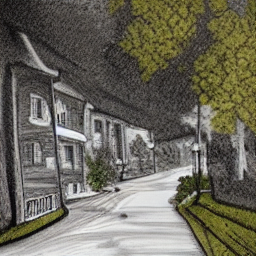Noday is the eighth day of the week on the Truman Show set.

A lay day. No filming. All the actors are elsewhere, lights and cameras on another production, tradies and techs doing maintenance perhaps.
Hence the street of our personal Truman Show is eerily quiet.
When the boulevard that graces Throsby Cottage becomes unnaturally subdued, Mrs T and I declare it 'Noday.'
"It's Noday today, darling," laments Mrs T.
"Thought as much. Been an hour since the last car went by," adds Mr T, a little too cheerfully (he likes solitude and silence).
"I saw but one person walk up the street. All day," she sighs. He sips tea and feigns commiseration.
Mrs T has been forty years in Australia and is still unused to the sterile serenity of the place. She was raised with nine siblings in a shoe box 'in middle of road' where calamity ran day and night and teeming life was a comforting vibrancy. Mr T was raised in the bush at the end of a dusty track. His childhood was wind-stirred eucalypts with a chorus of bird song.
The sound of traffic is a ceaseless ambient at Throsby Cottage.
Vehicular traffic follows a diurnal cycle, as one expects. Peak hours see a rush to and from work. Then evening food runs or outings, and at weekends a randomness. Sometimes there's one each 20 seconds, occasionally a stream of endless swooshing tyres almost like ocean waves (very relaxing). Then nothing for hours. Statistics at work.
There are days when the expected happens. A rush of workers' vehicles storm by at 5:30 am or thereabouts, which alerts us in the darkness of winter to dawn's approach. As does a chortling warbling magpie a hour before first light, whatever the season. The Australian magpie is unrelated to the Eurasian fellow, whose intelligence cost it repertoire.
It's the foot traffic, however, that lights up our lives. And nothing is more delightful than the abnormal pedestrians.
When we moved into Throsby Cottage the suburb had been in slow decline for many decades. It was considered the poor relative of the city precincts - strictly avoided by those seeking status, and last on the list of even those who could ill afford snobbery. But as the real estate market tightened like a noose around the wage-earners' finances, even this drab, uninteresting and dirty industrial suburban sprawl became the last affordable inner-city locale. And so they came, the yuppies.
What that meant - what it has to do with this background I'm boring you with - was that the large cohort, or demographic, of tenants found their rentals grow too expensive and eventually dry up as the yuppies renovated and assumed residence.
What that means to the tale is our supply of mental outpatients, unemployed, persons on remand, and assorted looneys and odd bods, well, slowly dried up. Nowadays, they're mostly dog walkers or the Fit Bit crowd.
Very sad.